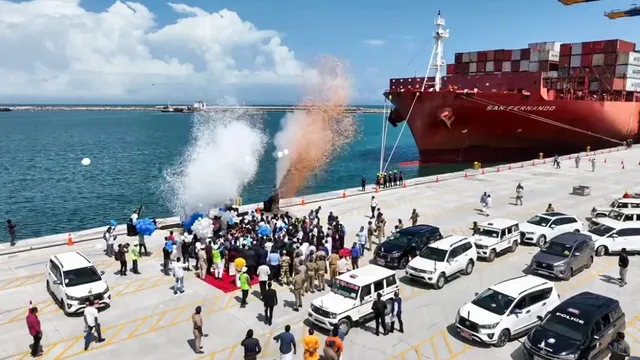- By Shibra Siddiqui
- Fri, 02 May 2025 12:27 PM (IST)
- Source:JND
Vizhinjam Seaport inauguration: Prime Minister Narendra Modi commissioned the Vizhinjam International Seaport in Thiruvananthapuram, Kerala, on Friday. Several dignitaries were present at the ceremony. The commissioning ceremony took place in the presence of Kerala Governor Rajendra Vishwanath Arlekar, Kerala Chief Minister Pinarayi Vijayan, Union Shipping Minister Sarbananda Sonowal, Union Ministers Suresh Gopi and George Kurian, state ministers, MPs Shashi Tharoor and AA Rahim, and Opposition Leader VD Satheesan.
Earlier, during a media briefing on Wednesday, Kerala Ports Minister V N Vasavan described the project as a symbol of national progress, as he said that it will be a ‘historic event’. Minister Vasavan highlighted the port’s operational achievements ahead of its official commissioning.
“The port began its trial run in July 2024 and received its commissioning certificate on 3 December. So far, 285 ships have arrived, handling 5.93 lakh TEUs, surpassing expectations even before formal commissioning,” he noted, adding that Vizhinjam has already begun attracting vessels from global operators like MSC.
“Vizhinjam can handle up to 30 lakh TEUs annually, and based on current performance, even 45 lakh TEUs is achievable,” Vasavan added.
The Kerala minister rubbished the political tensions around the project, saying “There is no conflict between the Centre and the State. It's not a CPI(M)-BJP project; it's a joint effort by both governments.”
Vizhinjam International Seaport: India’s First Deepwater Port
India’s first deepwater transhipment port is the Vizhinjam International Seaport, is specifically designed to handle large container ships. These ports are typically located in deep water, which allows them to accommodate the largest container ships in the world.
Deepwater seaports are vital to the global economy, acting as key hubs where cargo is transferred between ships. This process enables shipping companies to significantly reduce fuel and operational costs, while also accelerating global cargo transportation by minimising transit times.
ALSO READ: Pacific Ocean’s Most Active Underwater Volcano May Soon Erupt; How Dangerous Is Axial Seamount?

